- Home
- Alyson Noel
Unrivaled Page 2
Unrivaled Read online
Page 2
Yet despite their enormous differences, Mateo accepted her as she was. Never trying to change her or make her see things his way.
She wished she could say the same.
When he tipped a finger under her chin and lowered his lips to meet hers, Layla responded like a girl who’d spent the last three hours waiting for exactly that (she had). At first the kiss was gentle, playful, Mateo’s tongue gliding with hers. Until Layla ground her hips against his, returning his embrace with a passion that saw him groaning her name.
“Layla . . . jeez . . .” The words were a blur on his lips. “What do you say we find a place to continue this?”
She curled her leg around his, pulling him closer, as close as her denim cutoffs and his wet suit allowed. Aware of nothing more than the heat spiraling throughout the length of her body as his hands slipped under her hoodie. So drunk with his touch she’d gladly drag him down to the warm golden sand and straddle him there. Luckily, Mateo had sense enough to pull away before she got them arrested.
“If we hurry, we can have the house to ourselves.” His grin was loose. His eyes heavy and glazed.
“No, thanks.” Layla pushed him away, quickly losing the mood. “That last time Valentina nearly walked in, the panic I experienced shortened my life by a decade. I can’t risk that again.”
“So you live to one forty instead of one fifty.” He shrugged, tried to pull her back to him, but Layla stayed put. “I like to think that it’s worth it.”
“Easy for you to say, Mr. Zen Master.” It was one of her many nicknames for him. “Let’s go to my place. It’s free of little sisters, and even if my dad’s in the studio, it’s not like he’ll bother us. He’s really into his newest series of paintings, not that I’ve seen them. I’m just glad he’s working. It’s been forever since he last sold a piece.”
Mateo cringed. Obviously he still wanted to be with her, but all it took was the mention of her dad for his own enthusiasm to wane.
“I can’t get used to that.” He busied himself with packing their stuff, pulling the umbrella apart, and sliding it into its bag. “It’s too weird.”
“Only for you. Don’t forget Dad’s a self-described open-minded bohemian who believes in free expression. And more important, he trusts me. And he likes you. Thinks you’re a calming influence.”
She cracked a smile. It was undeniably true. Then, tossing her bag over her shoulder, she headed for Mateo’s black Jeep, where she plucked a flyer from under his wiper blades and read: Promote with Ira Redman’s Unrivaled Nightlife Company this summer for a chance to win an unbelievable cash prize.
Her interest was instantly piqued.
She’d had her sights on journalism school in New York since her junior year of high school, and while she was thrilled to have been accepted, there was no chance of attending when the staggering tuition, not to mention the high cost of city living, was like a brick wall blocking her way. And with her dad’s current financial slump lasting longer than usual, asking him for help was out of the question.
While her mom could easily provide whatever amount Layla might need (correction: her mom’s wealthy husband could provide; Layla’s mom was just another Santa Monica zombie shuffling between Soul Cycle and Drybar), the fact was Layla and her mom hadn’t spoken for years, and Layla had no plans to start.
As for Mateo—his job as a surf butler at some of the pricier beachfront hotels didn’t pay much (not that Layla would accept his help if it did). Not to mention she’d yet to fill him in on that particular goal—mostly because he’d insist on joining her, and as nice as it would be to have him around, he’d only end up distracting her. Mateo didn’t share her ambition, and sweet as he was, Layla refused to be yet another female who let a cute boy keep her from achieving her dreams.
She scanned the flyer again—a job like that could be just what she needed. The exposure to the Hollywood club scene would give her way better material, and who knew where it could lead?
Mateo leaned past her shoulder and tugged the flyer from her hands. “Tell me you’re not interested in this.” He swung around to better see her, his brown eyes narrowed as Layla bit her lip in response, unwilling to admit it was the most exciting thing to happen all day (other than that kiss on the beach). “Babe, trust me, you don’t want to get involved in this.” His voice was stern in a way she rarely heard. “The club scene is sketchy at best. You remember what happened to Carlos.”
She dropped her gaze to her sand-covered feet. She was overcome with shame at having forgotten about Mateo’s older brother, who’d OD’d right outside a club on Sunset Boulevard, not unlike River Phoenix collapsing in front of the Viper Room, except for the fact that nobody built a shrine in his honor. Aside from his immediate family, no one had even stopped to mourn. By the time Carlos died, he was so far gone the only friends he had left were drug dealers—none of whom bothered to go to his funeral. It was the greatest tragedy of Mateo’s life. As a kid, he’d totally idolized his brother.
But what if this was the perfect way to honor Carlos—maybe even vindicate him?
She reached for Mateo, her fingers grazing his arm before falling back to her side. “What happened to Carlos was the worst kind of tragedy, because it could’ve been avoided,” she said. “But maybe the best way to draw attention to Carlos and other kids like him is to expose what really goes on in that world. A gig like this would allow me to do that.”
Mateo frowned. She was going to have to try harder than that.
She stared at the flyer still clutched in his hands, knowing in her gut she was right. Mateo’s resistance only made her more determined. “I hate our celebrity-worshipping culture as much as you do. And I totally agree the whole club scene is one major sleaze fest. But wouldn’t you rather I do something to shine a light on all that? Doesn’t that beat sitting around and complaining?”
While he didn’t necessarily agree, he wasn’t arguing either. A small victory she was happy to claim.
“I have no illusions I’ll win the competition. Hell, I don’t even care about that. But if I can just get in on the game, I’ll have all the necessary ammo to reveal that world for the fraud that it is. If I can get just one kid to stop hero-worshipping those shallow, needy, undeserving assholes—if I can convince just one teen that the club scene is seedy, dangerous, and better avoided—then my job will be done.”
Mateo gazed at the ocean, studying the horizon for a long while. Something about seeing him in profile, shadowed by the fading rays of the sun, softened her heart. He loved her. He only wanted what was best for her, including keeping her far from the world that had claimed his brother. But as much as she loved him, she would not let him win.
He lingered on the postcard-perfect view of the sun dipping toward the ocean before turning to face her. “I can’t stand the thought of you getting mixed up in all that.” He clenched his fist, causing the flyer to crumple loudly. “That whole world’s a lie, and Ira has a well-earned reputation as the worst kind of scumbag who doesn’t give a shit about the kids who’ve made him rich. He only cares about himself. They dumped Carlos outside and let him die on the street so they wouldn’t have to call the ambulance and shut down the club for the night. Though you can bet they didn’t hesitate to benefit from the scandal.”
“But that wasn’t Ira’s club.”
“It’s all the same. Carlos was a smart kid, and look what happened to him. I can’t let that to happen to you.”
“I’m not Carlos.” The instant she said it, she was filled with regret. She’d do anything to pull the words back from the ether and swallow them whole.
“Meaning?”
She paused, not entirely sure how to explain without offending him further. “I’m going in with a purpose, a goal—”
“There are other, better ways to do that.”
“Name one.” She tilted her chin, hoping to convey with a look that she loved him but they’d reached a dead end.
Mateo tossed the flyer into the nearest can and propp
ed the passenger door open as though that was the end of it.
But it wasn’t.
Not even close.
She’d already memorized the website and phone number.
She inched closer. She hated when they argued, and besides, there was really no point. She’d already made her decision. The less he knew about it going forward, the better.
Knowing exactly how to distract him, she ran her hands up the length of his thigh. Refusing to stop until his lids dropped, his breath deepened, and he’d forgotten she was ever interested in promoting Ira Redman’s clubs.
TWO
WHILE MY GUITAR GENTLY WEEPS
“C’mon, bro—you gotta weigh in. We won’t leave until you do.”
Tommy glanced up from the copy of Rolling Stone he’d been reading and shot a bored glance at the two garage-band wannabes standing before him. Four and a half hours into his eight-hour shift and he’d yet to sell so much as a single guitar pick. Unfortunately, these two wouldn’t change that.
“Electric or acoustic?” they asked, voices overlapping.
Tommy lingered on a pic of Taylor Swift’s mile-long legs before flipping the page and devoting equal time to Beyoncé. “There’s no right or wrong,” he finally said.
“That’s what you always say.” The one in the beanie eyed him suspiciously.
“And yet, you keep asking.” Tommy frowned, wondering how long they’d persist before they moved on.
“Dude—you are like seriously the worst salesperson ever.” This came from the one wearing the Green Day Dookie T-shirt, who might’ve been named Ethan, but Tommy couldn’t be sure.
Tommy pushed the magazine aside. “How would you know? You’ve never once tried to buy anything.”
The two friends stood side by side, both of them rolling their eyes.
“Is commission the only thing you care about?”
“Are you really that big of a capitalist?”
Tommy shrugged. “When the rent’s due, everyone’s a capitalist.”
“You gotta have a preference,” Beanie Boy said, unwilling to let it go.
Tommy glanced between them, wondering how much longer he could put them off. They dropped in at least once a week, and though Tommy always acted like their incessant questions and attention-seeking antics annoyed him, most days they provided the only entertainment in an otherwise boring job.
But he was serious about the rent. Which meant he had no patience for bored little punks wasting his time, only to leave without buying so much as a single sheet of music.
The gig was commission based, and if he wasn’t actively selling, Tommy figured his time was better spent either thumbing through unsold copies of Rolling Stone and dreaming of the day he’d grace the cover, or scouring the web for gigs—minimum effort for minimum wage, seemed fair to him.
“Electric,” he finally said, surprised by the stunned silence that followed.
“Yes!” Dookie Boy pumped his fist as though Tommy’s opinion mattered.
It was unnerving the way they looked up to him. Especially when he wasn’t exactly living a life worth admiring.
“Why?” Beanie Boy demanded, clearly offended.
Tommy reached for the acoustic the kid was holding and strummed the opening riff of Deep Purple’s “Smoke on the Water.”
“Hear that?”
The kid nodded cautiously.
Tommy returned the guitar and reached for the electric twelve-string he’d been eyeing from the moment he started working at Farrington’s. The one he’d be a lot closer to owning if one of these punks ever decided to make themselves useful and actually buy something.
He played the same piece as the kids leaned toward him. “It’s louder, fuller, brighter. But that’s just me. Don’t go acting like it’s gospel or anything.”
“That was good, bro. You should think about joining our band.”
Tommy laughed, ran an appreciative hand over the neck of the guitar before returning it to its hook. “So, which one you gonna buy?” He glanced between them.
“All of ’em!” Dookie Boy grinned. He reminded Tommy of himself at that age—a lethal mix of insecure and cocky.
“Yeah, as soon as he sells his MILF porn collection on eBay!” Beanie Boy laughed and ran for the door as his friend gave chase, shouting insults that weren’t nearly as good as the one he’d been served.
Tommy watched them exit, the small silver bell attached to the handle jangling behind them, relieved to finally have some time to himself.
Not that he disliked his customers—Farrington’s Vintage Guitar was known for attracting a pretty specific, music-obsessed crowd, but it wasn’t exactly the job he’d envisioned when he first arrived in LA. He had some serious skills, all of which were going to waste. If things didn’t pick up, he’d have no choice but to track those kids down and beg for an audition.
Aside from playing the guitar, he could also sing. Not that anyone gave a shit. His last attempt to book some steady solo gigs was a fail. The hundred or so flyers he’d plastered around town (prominently featuring a picture of him in faded low-slung jeans with his guitar strapped across his bare chest) gleaned only two hits. One from some pervert asking him to “audition” (the sick giggle that followed had Tommy seriously considering changing his number), and an actual gig at a local coffee shop that seemed promising, until his original stuff was quashed by the manager, who insisted he play nothing but acoustic covers of John Mayer’s biggest hits for a full three hours. At least he’d managed to make a fan of the fortysomething blond who’d passed him a crumpled napkin with her hotel and room number scribbled in red, winking as she sashayed (no other way to describe it) out the door, sure that he’d follow.
He didn’t.
Though he had to admit he’d been tempted. It’d been a bleak six months since he’d arrived in LA, and she was damn good-looking. Fit too, judging by the dress that hugged every curve. And though he appreciated her directness, and while her body probably really was a wonderland, he couldn’t deal with the thought of being no more than an interesting diversion for a woman who’d grown bored with men her own age.
More than anything, Tommy wanted to be taken seriously.
It was the reason he moved halfway across the country with the entirety of his worldly possessions (a dozen or so T-shirts, some broken-in jeans, a turntable that once belonged to his mom, his prized vinyl collection, a pile of paperbacks, and a secondhand six-string guitar) shoved in the trunk of his car.
Sure, he figured it might take some time to get settled, but the shortage of gigs was never part of the plan.
Neither was the job hawking guitars, but at least he could tell his mom he was working in the music industry.
He turned the page of his magazine, only to see a full-page article praising the Strypes (fuckin’ sixteen-year-olds poised to take over the world—making Tommy wonder if he’d peaked two years ago and missed it entirely).
When the door clanged open, Tommy was glad for the distraction, only to see some rich bastard who looked totally out of place among all the Jimi Hendrix, Eric Clapton, and B. B. King posters slapped on the walls. His designer jeans and T-shirt alone probably cost more than Tommy made in a week. Never mind the suede blazer, flashy gold watch, and spendy-looking loafers—most likely handmade by craftsmen in Italy—that probably cost more than all of Tommy’s possessions combined, including his car.
Lifestyle tourist.
Los Feliz was full of ’em. Rich, wannabe hipsters, ducking in and out of the area’s numerous cafés, galleries, and eccentric boutiques, hoping to glean a little street cred they could haul back to their Beverly Hills hood and impress all their friends with tales of their journey to the wild side.
Tommy frowned and flipped past the article. Reading about the Strypes was bringing him down.
Waiting for the customer to complete his obligatory walk around, maybe even ask for a card (they made great souvenirs—proved you really were there!), was also bringing him down.
&nbs
p; But unlike the Strypes, this guy would eventually pass through Tommy’s life. Whereas every band in that magazine seemed to mock him, making him realize just how big a fail his move to LA had become.
Figuring he should exert a little effort and acknowledge the pretentious asshole invading his space, he started to speak when the words caught in his throat and he found himself ogling like the worst kind of groupie.
It was Ira.
Ira Redman.
The überconnected, big-shot owner of Unrivaled Nightlife, who also happened to be Tommy’s father.
Though the father bit was really more a technicality. Ira was more of a sperm donor than an actual dad.
For one thing, he had no idea Tommy existed.
Then again, up until Tommy’s eighteenth birthday, Tommy didn’t know about Ira either. He’d believed the story his mother told him about his war-hero dad who’d died before his time. It was only by chance he learned the truth. But once he did, his fate was sealed. Much to his mother’s (and grandparents’, and ex-girlfriend’s, and counselor’s) dismay, he took the money he’d saved for college, graduated early from high school, and headed straight for LA.
He’d had it all planned. First he’d find a great apartment (a shithole in Hollywood), then he’d score an awesome job (Farrington’s was severely lacking in awesome), and then, armed with all the details he’d gathered about his father courtesy of Google, Wikipedia, and an archived issue of Maxim, he’d track down Ira Redman and confront him like the independent, deserving young man that he was.
What he didn’t expect was how completely intimidated he felt just being in Ira’s vicinity.
Shortly after he’d first arrived in LA, he found and followed Ira, watching from the cracked windshield of the clunker that seemed cool in Tulsa and so offensive in LA that even the valet parkers sneered when they saw it. Tommy saw the dismissive yet entitled way Ira left his chauffeur-driven Escalade at the curb and strode into the restaurant like a man who consumed power rather than food. His grim, all-seeing gaze was cloaked in a calculated ruthlessness that immediately convinced Tommy he was out of his league.

 Shimmer
Shimmer Art Geeks and Prom Queens
Art Geeks and Prom Queens Radiance
Radiance Evermore
Evermore Echo
Echo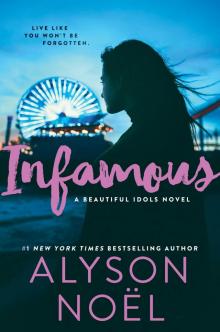 Infamous
Infamous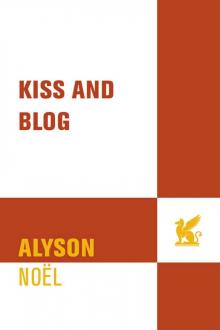 Kiss & Blog
Kiss & Blog Daire Meets Ever
Daire Meets Ever Blacklist
Blacklist Blue Moon
Blue Moon Shadowland
Shadowland Dark Flame
Dark Flame Fated
Fated Cruel Summer
Cruel Summer Night Star
Night Star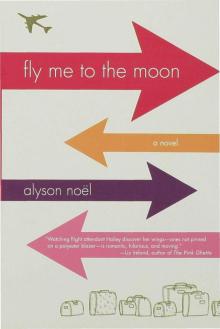 Fly Me to the Moon
Fly Me to the Moon Unrivaled
Unrivaled Everlasting
Everlasting Whisper
Whisper Echo (Soul Seekers)
Echo (Soul Seekers) Shadowland: The Immortals
Shadowland: The Immortals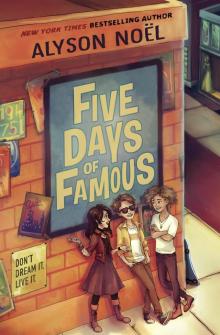 Five Days of Famous
Five Days of Famous Saving Zoe
Saving Zoe Dreamland
Dreamland The Soul Seekers: Horizon
The Soul Seekers: Horizon Keeping Secrets
Keeping Secrets Shimmer rb-2
Shimmer rb-2 Evermore ti-1
Evermore ti-1 Soul Seekers03 - Mystic
Soul Seekers03 - Mystic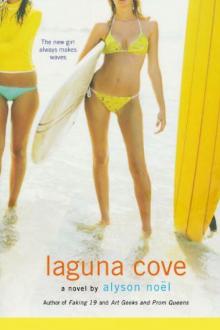 Laguna Cove
Laguna Cove Shimmer: A Riley Bloom Book
Shimmer: A Riley Bloom Book Night Star ti-5
Night Star ti-5